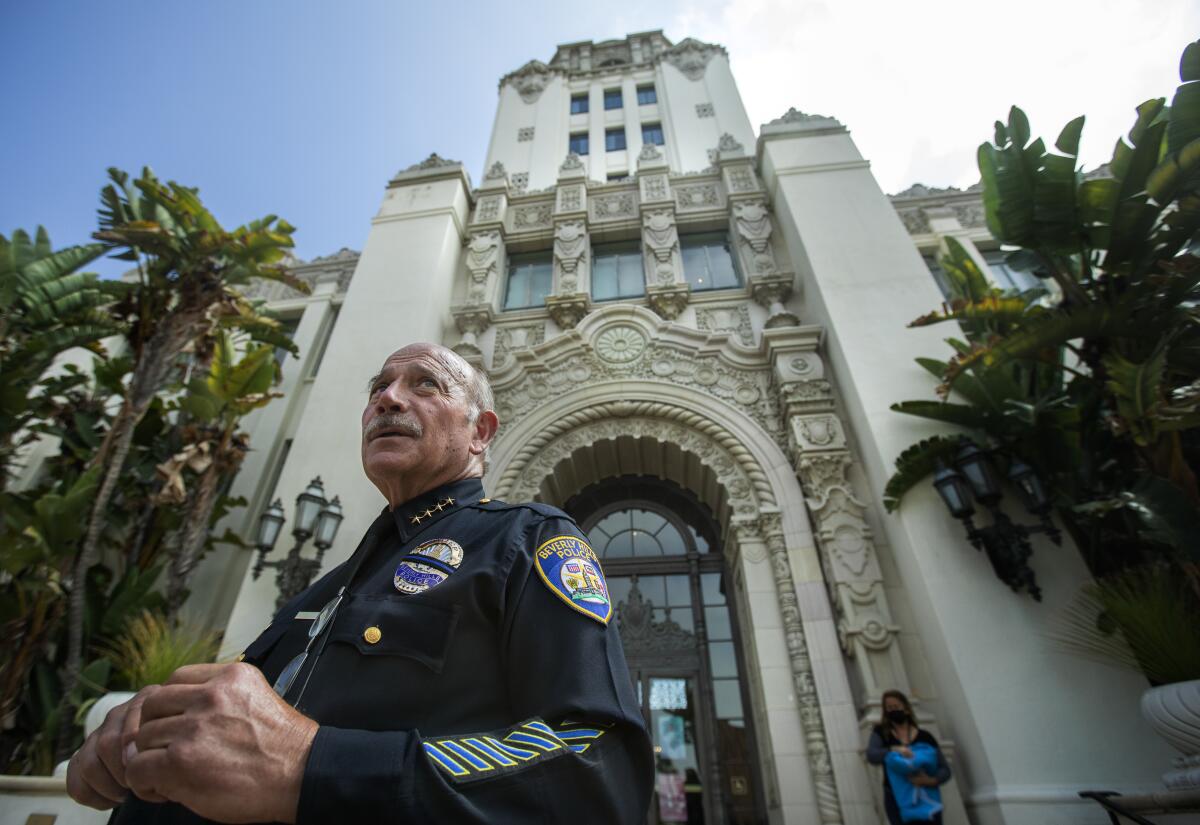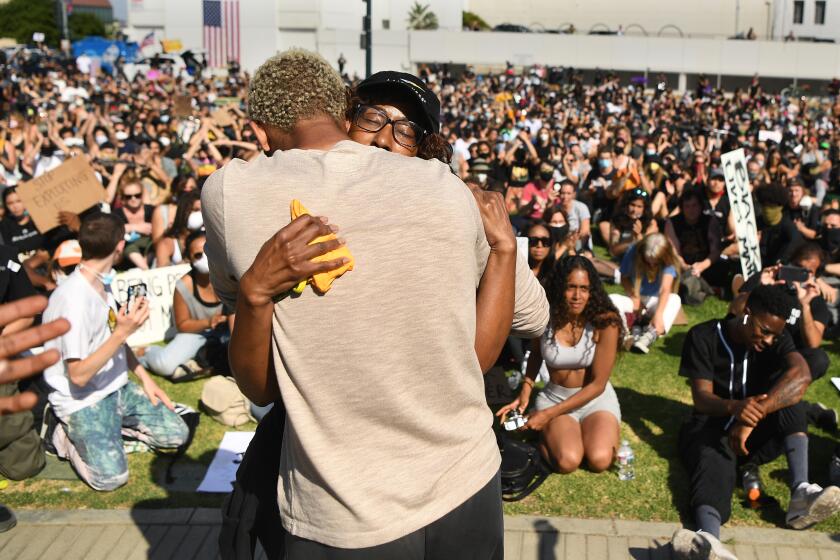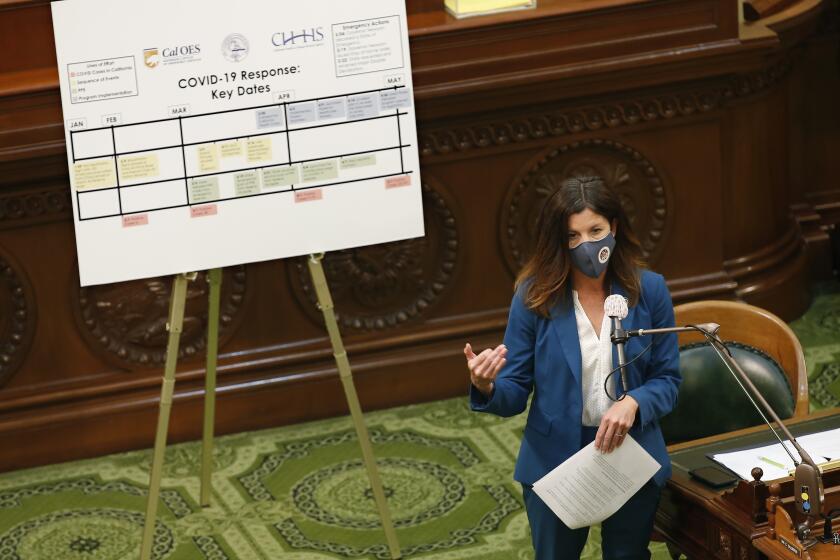Did Beverly Hills police target Black shoppers on Rodeo Drive? What records and emails show

- Share via
Last month, two attorneys summoned reporters to the steps of Beverly Hills City Hall to make a disturbing accusation. Police had deliberately targeted Black shoppers along the city’s famous Rodeo Drive.
The proof, they said, was in the numbers: A special team of officers assigned last fall to patrol the opulent shopping corridor arrested dozens of people for minor infractions such as jaywalking or riding scooters on a sidewalk and all but one of them were Black, they alleged. They labeled it brazen, illegal racial profiling.
A closer examination of the Beverly Hills Police Department’s Rodeo Drive Team offers a more complicated picture of the operation, shedding light on how it started and raising new questions about why the overwhelming majority of the people arrested were Black.
Ninety people were arrested by the unit. Eighty of them were Black, four were Latino, three were white, two were Asian and one was classified as “other,” according to the department’s figures obtained by The Times under a California Public Records Act request.
Police have not explained why the operation targeted Black people to such a degree.
The special detail was formed amid complaints over what residents and shop owners said was a “criminal element” on Rodeo Drive and was tasked with curtailing loud music, gambling, double parking, illegal street vending and “marijuana smoke drifting into stores,” according to police documents reviewed by The Times.
A few of the people were arrested for quality-of-life infractions like the ones the lawyers highlighted. One person, for example, was arrested for smoking in a prohibited area and three for filming without permits.
A Black couple have sued Beverly Hills over their arrest for riding a scooter on the sidewalk, an incident that their lawyers say was part of a campaign to arrest Black people for trivial reasons and at disproportionate rates.
The team’s focus, however, quickly changed to shoppers who officers suspected had come to Rodeo Drive for spending sprees with money they received from an elaborate scheme to defraud the state’s unemployment system, records show. Fifty-nine people were arrested on suspicion of identity theft, which, depending on the amount of money involved, can be charged as a felony or a misdemeanor.
The unit also made 36 arrests on suspicion of conspiracy, a felony charge, and 12 arrests on suspicion of carrying a concealed firearm, arrest records show. Some people were arrested on suspicion of more than one offense, said Keith Sterling, a spokesman for the city.
In all, Sterling said, the Rodeo Drive Team and other officers arrested 107 people on suspicion of involvement in the unemployment fraud scam. Of those, he said, he was aware of “at least 10” who were charged with crimes by prosecutors in the L.A. County district attorney’s office. Some cases are still being investigated, he added.
It’s unclear why so many people arrested were not charged.
Bradley Gage, a Los Angeles attorney who along with civil rights lawyer Benjamin Crump has filed a lawsuit on behalf of two of the people arrested, said the department’s arrest figures underscore his belief that Beverly Hills police had discriminated against Black people.
“In fact, I think it strengthens it,” he said, noting that the allegations in the lawsuit were based on information from retired Beverly Hills officers, rather than figures from the department. “Even going by their numbers — 80 out of 90 arrested are Black. That’s ridiculous. You have to be purposely targeting Black people to begin with.”
Gage said he supports the prosecution of people who have committed crimes, such as benefits fraud, but he questioned why almost all the suspects identified by Beverly Hills police were Black.
“How do you determine a person is suspicious of EDD fraud?” he asked, referring to the state’s Employment Development Department, which administers the benefits.
Sterling, the city spokesman, declined to describe the specific reasons those arrested came under suspicion and did not address why 8 out of 9 of them were Black.
In a statement to The Times, he said only that “the department’s practice is to contact and question individuals when it is believed they may be involved in criminal activity or another violation of the law” and that the Rodeo Drive unit was “protecting the constitutional rights of all people.”
The birth of the Rodeo Drive Team
Benefits fraud had not been on the minds of police officials when they launched the idea for the special detail, emails and other records obtained by The Times show.
Chief Dominick Rivetti instead was facing questions from a handpicked group of residents called the Chief’s Advisory Panel upset about what they saw as a troubling rise in crime along Rodeo Drive, according to minutes of a meeting the panel held Aug. 12, 2020.
One panel member told the chief that “the criminal element that is seen in the business district has spilled over into the residential neighborhoods,” the minutes say, “enough to [make her] feel uncomfortable outdoors.” Another panel member complained that the “criminal element” was “bleeding into other parts of the city.”
Merchants on Rodeo Drive had also brought a “multitude” of complaints about criminal activity to the Police Department, according to a memo circulated between police officials.
About a week after the advisory panel’s meeting, a lieutenant emailed other police officials about establishing a “core group of officers and supervisors assigned to Rodeo Drive.”
Even as some L.A. County officials refused to charge peaceful protesters last summer, Beverly Hills tried to prosecute demonstrators under an emergency ordinance.
“The direction,” he said, “has stemmed from the chief.”
The team was formed to address “quality of life complaints” on Rodeo Drive such as loud music and marijuana smoking, according to a copy of a presentation Beverly Hills police gave to other law enforcement agencies. Around this time, in the summer of 2020, the department had also noted a rise in “blatant criminal behavior,” such as car theft and armed robberies, the presentation said.
In fact, overall crime in Beverly Hills was down 17% at that point in 2020 compared with the year before, according to the emails.
The stores along Rodeo Drive had seen a rise in thefts and other crimes, however. Police had responded to 41 crimes in the area through Aug. 24 — up from 25 during the period in 2019. The Gucci store alone was the site of 13 thefts.
Discovering evidence of bigger fraud
About a week after launching, the Rodeo Drive Team turned its focus to EDD fraud, emails show. One of the detail’s supervisors, Lt. Blake Nance, wrote to his superiors on Sept. 6, 2020, that they had confirmed “massive fraud underway with CA’s EDD system.”
Nance outlined a complicated scheme in which the alleged fraudsters used fake identities to obtain fraudulent state benefits. He suggested the fraud was widespread: “Rap songs even brag and educate listeners about the sites,” he said. Some were arriving from out of state to spend the benefits on Rodeo Drive, he added.
California has paid roughly $20 billion in fraudulent unemployment benefits to scammers, about 11% of all benefits distributed since the beginning of the COVID-19 pandemic, state officials said this week. Among the state’s mistakes was disbursing an estimated $810 million in unemployment funds to 45,000 state prison inmates and approving a bogus application for $21,000 in benefits made out in the name of U.S. Sen. Dianne Feinstein (D-Calif).
California has paid at least $20 billion in fraudulent unemployment benefits since the start of the pandemic.
Sgt. Billy Fair, who was assigned to the Rodeo Drive Team, sent out a departmentwide email suggesting, vaguely, that “LA gangs are using EDD fraud money to purchase guns and drugs.” Fair offered no evidence to support the claim, writing that it was “not uncommon” for fraudsters to drive “high-end” cars or wear expensive clothing and jewelry.
In a letter to some of the city’s marquee retailers, including Gucci, Prada and Valentino, Chief Rivetti advised that shoppers trying to pay with debit cards issued by the state’s employment agency should be asked to show identification that matched the name on the card. If a customer refused, Rivetti said to call the police.
Beverly Hills Police Chief Sandra Spagnoli announced her retirement Saturday, ending a rocky tenure for the city’s first female top cop that was marked by more than 20 lawsuits or claims of misconduct.
Nance proposed bringing the story of rampant fraud to a handpicked journalist, who would interview a suspect cooperating with police, a retailer and someone whose identity had been stolen for the scam.
It’s unclear whether Beverly Hills police approached any media outlets with the story idea.
By late September, complaints of crime on Rodeo Drive had “lessened,” according to a memo written by Nance, the unit’s supervisor. Nance said police had made 87 arrests in connection with alleged EDD fraud, had seized eight firearms, confiscated $466,821 in cash and $43,885 in postal money orders, and taken 181 EDD debit cards.
Department officials planned to give the U.S. attorney’s office in Los Angeles the “first right of refusal” to file federal charges against the dozens of suspects, Nance wrote in his memo. He wrote in an email that once charges were filed, he envisioned “press releases go out to those home towns where these arrestees came from highlighting that local gangsters have been federally indicted for EDD fraud purchases on Rodeo Drive/Beverly Hills.”
The Rodeo Drive Team was disbanded on Oct. 24, 2020, two months after it started. Its eight members were honored by the city for their “outstanding job performance” as part of the city’s annual Employee Excellence Awards, emails show.
But news of the team’s work remained largely unknown outside the insular world of Beverly Hills until nearly a year later, when Gage and Crump announced their lawsuit in front of City Hall.
“We are here because the Beverly Hills Police Department arrested African Americans for being Black on Rodeo Drive,” said Crump, a prominent civil rights attorney who represented George Floyd’s family and others in high-profile police shootings around the country.
Jasmine Williams, one of the plaintiffs, described being handcuffed and jailed after being stopped for riding a scooter on the sidewalk. “I was scared,” she said. “I’ve never been to jail in my life.”
In response to the lawsuit, the chief emailed residents a statement denying the allegations, saying his officers were “committed to keeping our community safe while enforcing the law with respect and dignity for all.”
Several residents replied with messages of support.
“Dear Dominick...Love you more each day!!!! Thanks for your amazing work in keeping us all safe!!! Hugs, Bruce,” wrote Bruce Meyer, a retailer and car aficionado who helped found the Petersen Automotive Museum.
Meyer could not be reached for comment.
More to Read
Sign up for Essential California
The most important California stories and recommendations in your inbox every morning.
You may occasionally receive promotional content from the Los Angeles Times.













